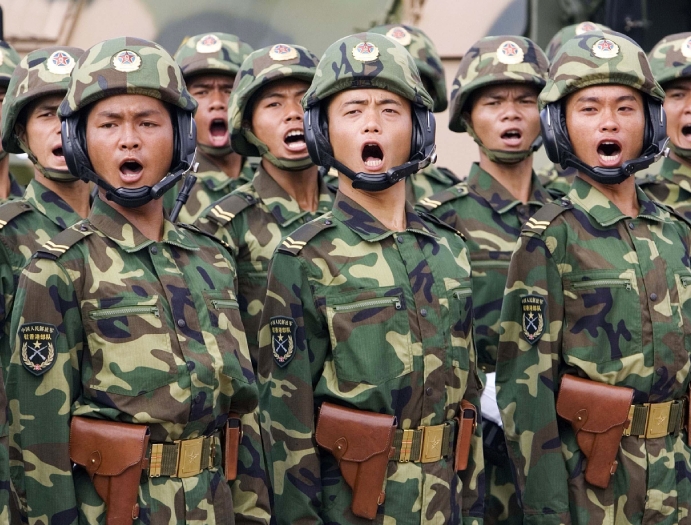Climate Change, Human Rights,
Multilateralism, Anti-racism and the Pandemic challenge, among others, have all
suffered in the last four years due to United State either walking out or
failing to give leadership. Barring any Trumpian earthquake to US democracy, Joe
Biden’s victory has sent a sigh of relief round the world. It gives hope of US
re-engaging in these urgent issues. But the balance of power has changed in the
world and there is also apprehension that Biden could be tempted back to the
Democrat’s habit of interventionist wars.
The United States walked away from the
United Nations Human Rights Council (HRC), partly due to repeated concerns
raised about Israel. It must have been Trump regime’s assessment that the HRC
might become a useless forum or even fold up if it walked away. None of that
happened. The US seat at HRC Geneva usually remains empty or a cheeky NGO
sometimes sits there. Its exit or rather absence hasn’t stopped anything. The
world carries on regardless, with countries like China and Russia often
dominating the scene.
However, the human rights debate is
slightly weaker with the leader of the western world on a sort of AWOL. The US
is also not there to answer the many issues raised about its record by other
countries.
The Human Rights discourse at United
Nations is undergoing subtle shifts away from traditional understanding of human
rights based on individual rights to a Chinese-led new perspectives of human
rights. The Chinese are promoting a Confucius compliment where the individual
also has responsibility to collective rights. China wants to dilute individual
rights to duties towards the State. While European countries have been putting
up a robust challenge, their effectiveness is weakened with the US missing.
Countries are increasingly accepting a Chinese leadership. These are
challenging times.
It is the Climate Change field that needs
urgent leadership to reverse the suicidal damage that the human race has
wreaked on the earth and its atmosphere. Scientists are alarmed at the rapidity
of change taking place, especially the melting snow in the North and South
Poles. The erosion of Amazonian Forest, the lungs of the world, is causing
concern throughout while the number of fires, storms and natural disasters are
stretching the ability of the world to cope.
Countries like China have been filling the
leadership gap as have some European countries. India has tried but has been
credited with more rhetoric than action as Indian cities continue to top the
world in pollution rates.
China however is not a natural leader for
most of the world used to democracy and free press. It faces cultural barriers
to fostering leadership empathy. Moreover there remains considerable distrust
of its intentions as has been seen in the 5G technology.
Relations between China and India remain
tense. This makes it difficult for the two somewhat unequal but nevertheless
important Asian giants to embark on collective leadership of the climate issue.
China also has political differences with other neighbours in South East Asia,
making it difficult for it to fill a vacuum left by Trump’s America.
Although Europe is increasingly realising
that it has to stand on its own feet, its influence is hampered by its bloody
history of colonialism. Secondly its own internal structures are weakened by
fissiparous tendencies. Besides, rival leaders sometimes compete to become
prima donnas on the world stage. Europe has for long depended on the United
States to give it extra clout in the world.
The Climate Change putsch needs both the
United States and China to work together to give global leadership. This is
where the Biden Government will be most welcomed by the world. Trump not only
walked away from multilateral efforts but more damagingly walked out of the Paris
Agreement. COP 26 at Glasgow might be more promising now with Biden at the
helm of United States.
The United States has most miserably failed
in providing any leadership or even support in the Covid-19 pandemic crises.
Unlike other disasters that are regional, the Covid-19 pandemic has swept the
entire world. It has engulfed the United States more than most countries. It
may have been a virus that jumped from a market in China, but it is now
characterised by the way the United States has addressed this real crises.
Trump quite clearly has been out of his
depth to lead his own people in the pandemic crises let alone set up a world
leadership drive to contain the Pandemic. Coming out of WHO at a time when the
world needed it most, for petty issues of jealousy such as why does the WHO
leadership fawn over China more than
Trump at a time when people are dying in thousands is the height of absurdity.
When WHO needs funding the most, the USA withdrew it through a tweet.
There are many world issues in which the
United States has effectively been absent. This has also enabled the world to
get on with its problems without depending on this biggest superpower and
financial payhouse. This new reality may be a challenge for Biden and American
sense of its place in the world as it seeks to reclaim leadership.
The world is genuinely multilateral now.
Gone is the period of sole superpower dominance. The clock cannot turn back. A
returning United States will have to realise that its place is no longer
automatically at the head. There is China, there is Russia, there is an
upcoming India and there is a Europe learning to assert its own power.
While still the most powerful country in
terms of political clout, arsenal and capital, the other powers are no longer a
push over. Much as a liberal world might want USA to jump into Hong Kong
politics or warn China against South China Sea expansions or its border
skirmishes with India, the United States is unlikely to frighten China as it
may once have been able to do. China has sat out the Trump economic wars and
has enough resourcefulness to outlast even a possible two term Biden
Government.
Neither is Russia likely to stop meddling
or throwing its weight around. Much has changed in the four years in which the
US has been absorbed with itself, defining and fighting the ‘other’ within its
own borders. Trump was forever fighting imagined enemies within. He equated the
robustness of democracy and free speech to conspirators against him. His tweets
targeted fellow Americans rather than enemies of America.
This election has exposed the open
underbelly of America. White supremacists and the rest of America have two
different visions of the United States. While optimists are calling on Biden to
heal the wounds within, the fissures may have gone too deep now. A lot of his
energy is also likely to be absorbed to keep the country together. The
possibility of United States splitting up in a decade or so, is not far-fetched
anymore. His biggest challenge will be to give a new vision to a fractured
country.
It is that which makes USA weak on the
world stage now. Usually democracies embark on wars abroad to keep unity
within. But the fissures are solidifed for that. Moreover, the biggest foe,
China, is too experienced and savvy to fall for the trap. It is deft at
sidestepping confrontation and then timing it right.
After four years of absence, the United
States’ return to the world stage is much welcomed and rejoiced. But Biden and
his colleagues must realise that the world is much changed. It is genuinely
multilateral. They say a week is a long time in politics. Four years is almost
a lifetime in politics.



